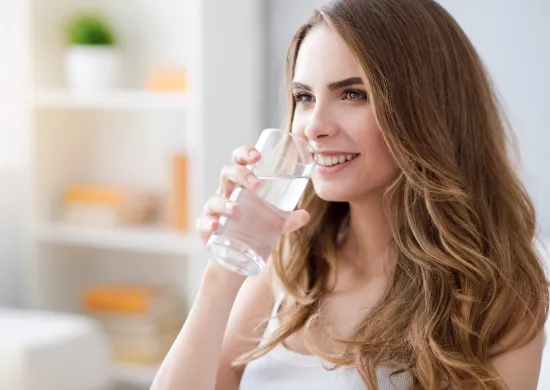Human body is made up of 50-70% water. Also, our body needs water for the cells and tissues to be hydrated as well as to maintain the body temperature. It is also vital for many other functions of the body. Men should drink 2.5 litres and women should drink 2 litres of water per day. (The numbers represent placeholders for the actual quantities). Ayurveda says water is “Jeevana” – enlivening, water is “Tarpana” – satiating, water is “Hladi” – gives joy, water is “Amrutopama” – like nectar! But what is the right temperature of water that you should be drinking? Hot water? Warm water? Room temperature water? Internet says something, books say another! It is confusing, isn’t it? Rather than the kind of water that everyone should drink, Ayurveda has clear-cut recommendations on who should drink what. In this blog, let us explore, furthermore, the type of water you should drink, as mentioned in Ashtanga Hridaya Sutra Sthana. Room temperature water According to Ayurveda, room temperature water is water that is boiled and cooled down to room temperature. Drinking room temperature water is more beneficial than warm water in these conditions: After having alcohol If you are tired, exhausted or feeling giddy If you are extremely thirsty If you have been out in the sun If you have bleeding disorders If you have food poisoning Warm water According to Ayurveda, drinking warm water, in fact, makes you feel lighter. It also helps improve Kapha Dosha. Drinking warm water also helps reduce the chances of you feeling hungry, thus preventing overeating and reducing your urge to consume junk food. Drinking warm water is better in these conditions: If you have less appetite If you have low digestive fire If you have throat pain or sore throat If you have fever, cough, cold If you have aches and pains If you have flatulence Ayurveda does not recommend drinking cold water as it cools down the digestive fire (Agni), thus affecting your digestive process. Ayurveda also has certain guidelines for drinking water – taking small sips, drinking water while standing and not immediately before or after having food, being some of them. If you are struggling with any health issues, you can either book a consultation with us or send us a message via WhatsApp to +91 79074 89839. We have the best Ayurvedic doctors in Trivandrum who are always glad to help you. If you have any queries, contact us. You can also visit us at our hospital.
Temperature Of The Water You Should Drink
